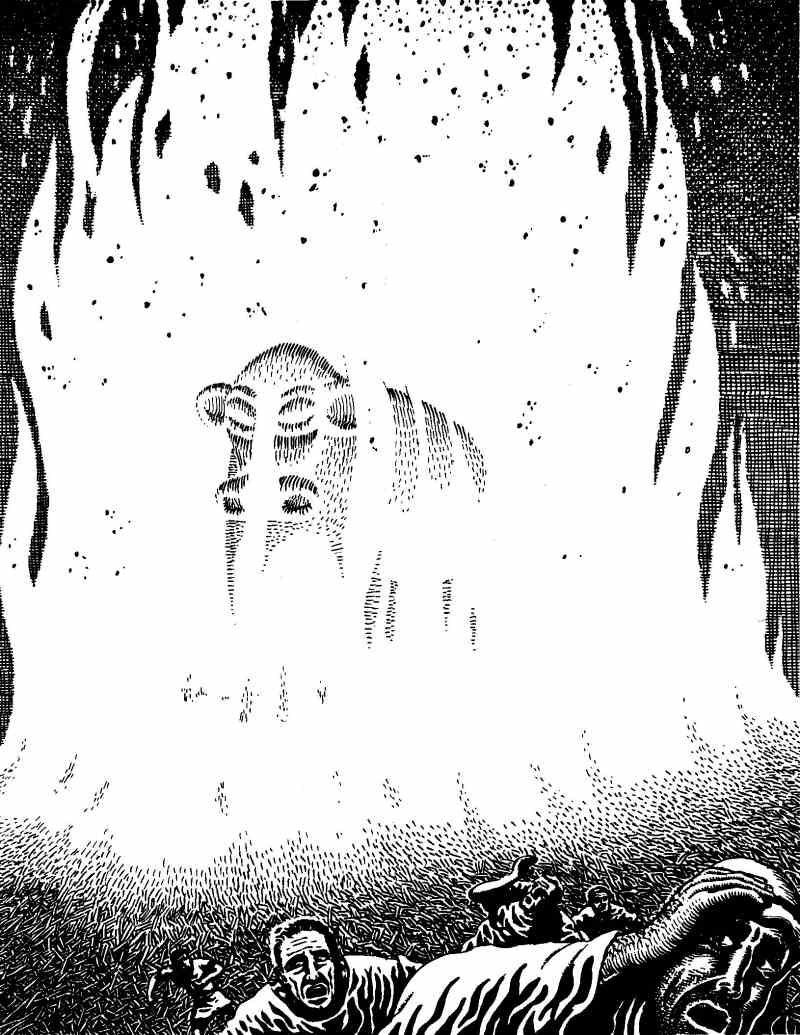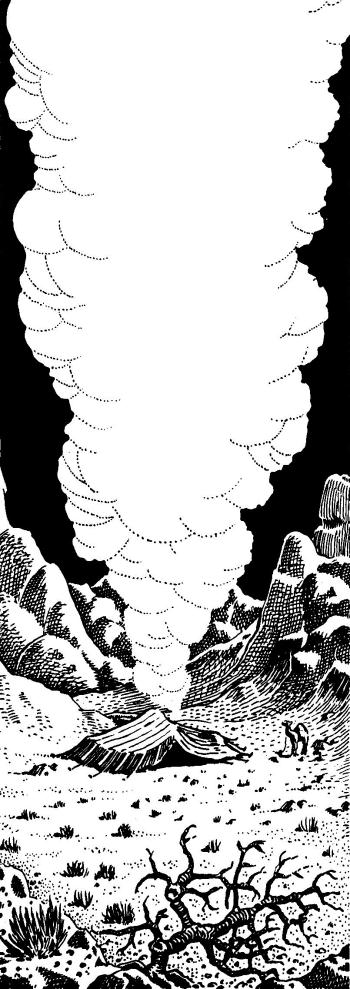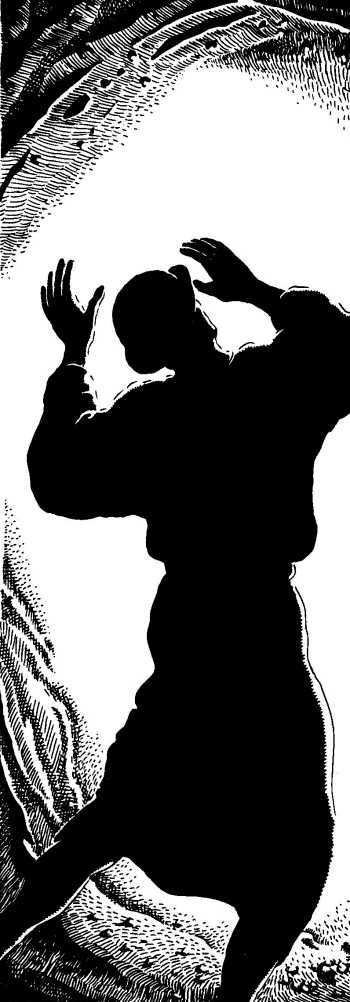AS MOSES and Joshua walked up to the edge of the crowd, people who saw them quieted down and stared in silence. Moses was shocked and angry when he saw and heard so many, bowing, parading, dancing and singing around the gold-covered calf statue. Still carrying the stone tablets, he grimly elbowed his way through surprised onlookers to a spot in front of the pagan altar.
"Engraved here is the agreement we made with the Creator only a few weeks ago!" he shouted, holding the tablets aloft. "You promised to keep it, but you are already breaking it!"
Because there was so much noise, only those who were closest looked for the source of the new voice. When they recognized Moses, they quickly directed the attention of others to him. Within seconds silence ensued. Thousands of pairs of eyes stared with unbelief. A murmur of awe rumbled up from the people.
Moses was too filled with fury to say more. For the moment he lost control of his temper.
Tables of Stone Broken
He hurled the stone tablets down with such force they shattered on the altar, the fragments flying in all directions. (Ex. 32:19) Even before the rash act was finished, he realized how impetuous he was acting by breaking something holy that had come from God.
Onlookers stared soberly and began to slink back toward their camps. Before long the throng had dissolved. The few who remained, being mostly of those who had prevailed on Aaron to produce the idol, gathered in sullen groups. Aaron, Hur and the officers and elders had little to say, and stood uncomfortably by. It was obvious to Moses that they deeply regretted having handled matters poorly.

Intense heat from the heaps of burning wood and brush soon
melted the golden calf down to the ground.
|
"Build a roaring fire around the statue!" Moses suddenly commanded. "Melt down all the gold in it! As soon as it cools, pick every bit of it out of the ashes and grind it into fine powder! Then dump that powder into every source of water the people use!"
Most of the Israelites were relieved to see the image melt to the ground, though there were many who bitterly resented seeing their idol come to such a swift end. Hours later, it was impossible to draw water from any natural sources without including much gold dust. Those who had to drink it who weren't guilty were warned by the pollution of the folly of idolatry. Those who were guilty were reminded of their sin. (Ex. 32:20)
Aaron Repents
"How did the people manage to talk you into this terrible situation?" Moses asked Aaron after matters were in hand.
"You know how the people are," Aaron answered. "They so often want to do the wrong thing."
Moses considered that a poor answer, and Aaron wasn't anxious to explain all about how he had tried to stall for time. Moses was far from happy with Aaron's eventual account. "If I could have delayed the idol's construction one more day," Aaron weakly pointed out, "you would have arrived in time to prevent most of the trouble."
|
Feeling that further words to the shame-faced Aaron would be of little value at a time when other things needed accomplishing quickly, Moses sent officers through the camps to find the men who had staunchly refused to have anything to do with worship of the golden calf. Later, a crowd of men was brought to the camp where Moses' tent was pitched.
"These are the ones who claim loyalty to God," Moses was informed. "They are of the tribe of Levi, and are anxious to do anything to please God." (Ex. 32:26)
"Good!" Moses said. "I have great need of them. God expects the covenant breakers to be punished. He will do it through the swords of these dedicated Levites!"
The Levites stared in uncomfortable silence.
"I know how you men must feel," Moses went on. "Some of you may be friends of the guilty, but God intends for them to die by your weapons. No blood will be on your heads, because you will be carrying out divine justice."
This was a difficult and grisly task for the Levites to carry out, but they were determined to be obedient. By the end of the day about three thousand men had been arrested and executed. (Verses 27-28)
Next day, during mourning for the dead, Moses called the elders.
"Go remind your people what a great crime has taken place here," he instructed them. "Though the guiltiest have died, God is angry with all the people for allowing it. I will climb back up the mountain to plead with Him not to bring punishment that will be too severe."
By this time, Aaron had become so conscious of his weak role in things that he was busy doing his own praying.
Moses Returns Atop Sinai
"My people have sinned more than I realized at first," Moses told God when he was again up the mountain. "I beg you to forgive them. If you don't intend to, I pray that you will take my life instead of dealing harshly with them!"
"I shall not cause the innocent to suffer," God answered. "Neither shall the guilty escape my anger. Go back and tell the people that because of breaking my covenant, I will no longer remain close to them, lest I blot them out if again they so carelessly break my laws. I shall send an angel to do the leading to Canaan, and will decide how to deal with them after I find out how much they regret their sins." (Ex. 33:1-3)
The people were unhappy at learning God was going to remove Himself from them somewhat. To show their regret for the idolatry that had taken place, they denied themselves the use of their jewelry and ornate clothing, having been instructed by Moses that they should show humility. (Ex. 33:4-6) God was so moved by this spirit of repentance that He withheld the punishment He had in mind.
|

Whenever Moses needed to talk with God,
he went to the special tent pitched off by
itself,and God met him there in the cloud.
|

Even before Moses could clap
his hands over his eyes,
the dazzling figure was gone.
|
In past weeks, Moses had gone to a special tent outside the camp when he needed to talk to God. People would know when he was doing this, because the guiding cloud would descend over the tent. But after God decided not to be so close to the Israelites, Moses had to have the tent moved away quite a distance before God would meet him in the cloud. The people noticed this, and were perturbed, but they were thankful that Moses and God didn't leave entirely.
Plans for the Future
In one of his visits with God, Moses boldly inquired how he should go about getting the Israelites started again toward Canaan. God was pleased by Moses' concern for the people. He rewarded him by the welcome news that He would continue helping guide the Israelites. Moses had a sudden strong desire to see what this merciful Creator looked like, but God informed him that it wouldn't be possible to see His face.
"I want you to bring two stone tables up Mount Sinai for Me to write the Ten Commandments on again," God said. "When you do, I shall pass very near to you, and you shall see My presence."
Next day Moses forcefully warned Aaron, Joshua and Hur he would be gone for a time, and that it would be up to them to preserve order in the camps or risk the lives of all the Israelites. Taking the expertly-cut tablets, he went up Mount Sinai early next morning. At the same time the cloud floated down to cover the peak of the mountain.
"Conceal yourself in the small cave here on the ledge," a voice instructed. "Do not emerge until your God has passed by the cave."
Moses stepped into the opening in the solid rock and waited. Suddenly he found himself shaking nervously. There was a dazzling light. The Creator of the universe — the One who later became Jesus — was approaching!
"I am the Eternal God!"
The tremendous voice, seeming to come from all directions, cracked like lightning without being unduly loud. The growing brilliance became so strong it stabbed through Moses' closed eyelids. In another instant it became so dazzling Moses could make out a rather indefinite figure standing back to him. It lasted only for a moment, and was gone before he could clap his hands over his closed eyes to protect them. (Ex. 34:5-6)
"I am merciful and gracious," the Voice continued. "I am slow to anger, loving and faithful. My love for thousands is not to be swayed. I forgive men of their sins, but I will punish those who continue in their guilt. I will bring punishment on their children, their grandchildren and even their great grandchildren."
Trembling and almost blinded temporarily, Moses stumbled out of the little cave and dropped face downward.
"If I have found favor with you, forgive the sins of my stubborn people!" Moses exclaimed. "Dwell with us! Don't cut us off from your protection and blessings!" (Verses 7-9)
|
"I will renew the covenant!" God said after a short period of silence. "I will do great and marvelous things for your people that have never been done before!"
God went on to repeat many of the plans He had already disclosed during Moses' previous forty days and nights on the mountain. Moses stayed again for the same time, fasting and being sustained by divine power. For the second time God engraved the Ten Commandments on stone. When at last Moses returned to camp, he was happy to find no trouble there and pleased to bring the new tablets and the promise of a renewed covenant. (Verses 27-28; Deut. 10:1-5)
On reaching the slopes of the mountain, he was startled because the first people to meet him stared and backed away in fright.
"Look at his face!" they muttered fearfully.